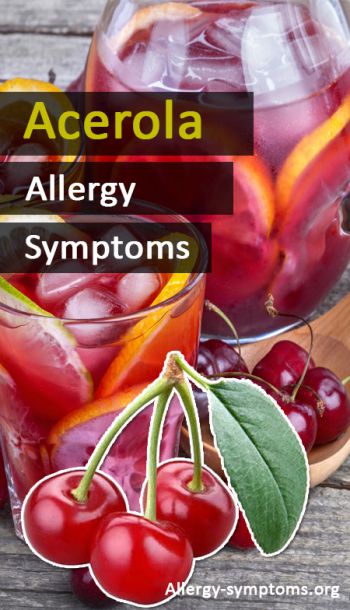Acerola allergy symptoms are rare, but it can lead to anaphylaxis condition is not treated.
Acerola is prominent for its vitamin C and ascorbic acid properties. This fruit is incorporated in fruit juice, ice creams, jams and other food products for the delicious flavor and nutritional benefit.
But, a case of a 35 year old man has been reported anaphylaxis situation after ingesting apple juice with acerola in it. (1)
A food allergic reaction triggers due to adverse reaction of immune system towards harmless food substances. IgE antibodies are produced to combat them.
These molecules when detects identical protein substances, immediately they stimulate a chemical reaction resulting in different allergic signs.
Cases has been reported where a hypersensitive person just inhaled or touched the allergen and allergic reaction triggered.
According to reports and studies potential cross reactivity between fruits of identical family can be allergic. Pollen that travels through wind can accumulate over the fruit resulting in the reaction.
However, if pollen is the only cause, then cooking will remove pollen.
Symptoms of acerola allergy include, hives, itching, redness, dyspnea (difficulty in breathing), tachycardia (rapid increase in heart beat) and oral allergy syndrome.
Swelling of lips and throat, blisters, sneezing, nasal congestion, red watery eyes, tingling sensation of tongue, asthma, respiratory issues as listed above, digestion problems like stomach cramps, indigestion and headache can be experienced by the person.

Allergic symptoms triggered by food can be acute, moderate or severe. In rare cases when the immune system reacts harshly towards the protein substances, the symptoms lead to life threatening conditions.
Skin prick test must be conducted to confirm the allergen. Depending on the allergic signs, the food allergen can’t be detected. Allergist will expose your skin towards different substances for testing.
Positive report confirms the availability of IgE antibodies that trigger allergic reaction.
Along with prescribed medication, hypersensitive person must avoid ingesting acerola in any form.
Food products like ice creams and juices that include acerola must be avoided.
There are cases where the person experienced allergic reaction, when small amount of allergic food was ingested.
Inhaling, touching and ingesting possibly stimulate the chemical reaction.
Acerola allergy symptoms are similar to other food allergies, so normal person can’t detect the specified allergen. A practicing specialist needs to carry skin prick test.

